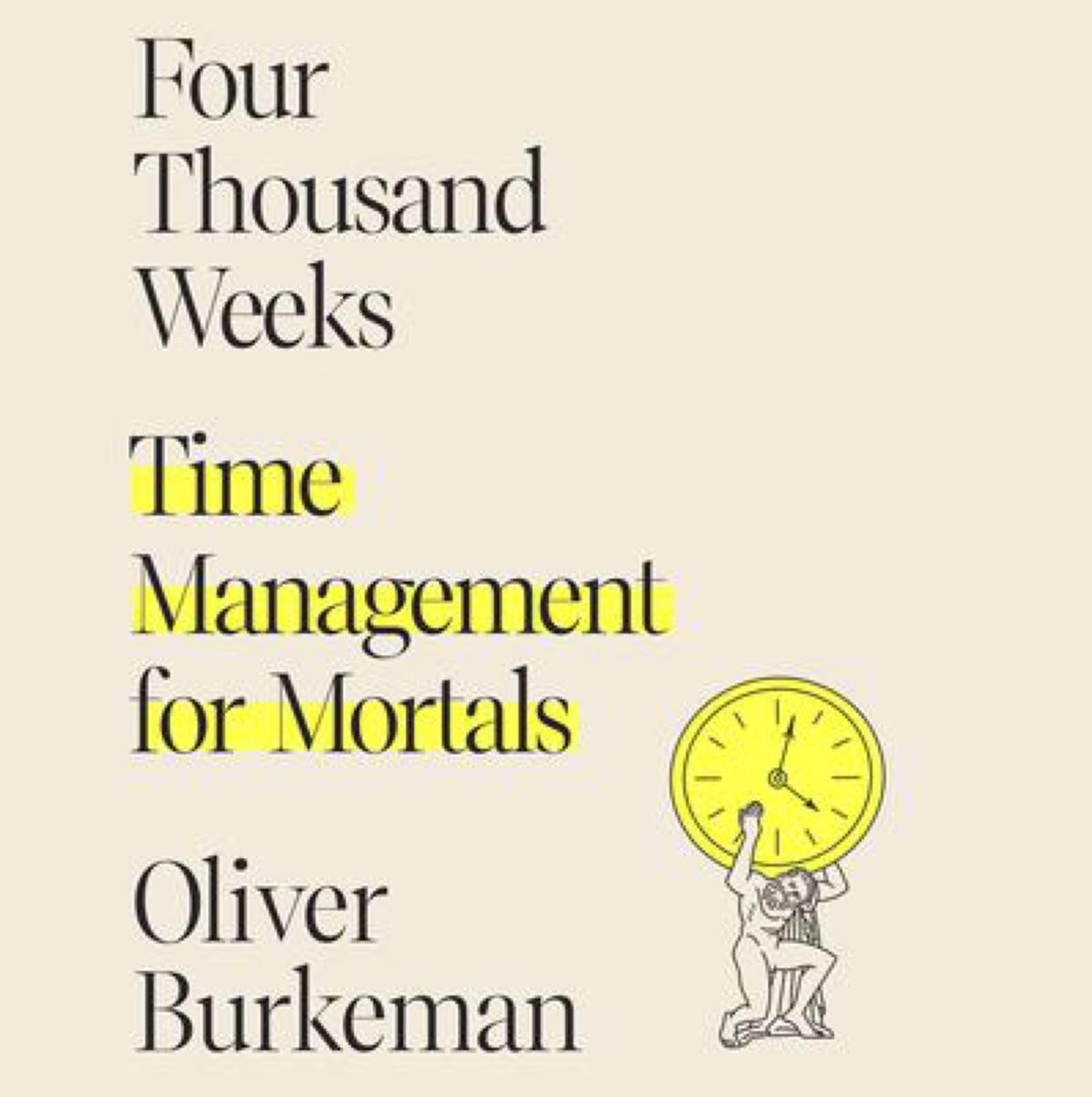Learn more about productivity with this collection
How to write clearly and concisely
How to use proper grammar and punctuation
How to structure a business document
Life Is About 4000 Weeks Long
The average human lifespan is absurdly, terrifyingly finite. If you’re lucky and you live to 80, you will have lived about four thousand weeks. This truth, which most of us ignore most of the time, is something to wrestle with if we want to spend our limited time on this earth well.
159
1.32K reads
Time Management Is Not Bulking Up. It Is Leaning Down.
Given that, it follows that time management, broadly defined, should be everyone’s chief concern. Yet the modern discipline of time management (or productivity) is depressingly narrow-minded, focused on devising the perfect morning routine or trying to crank through as many tasks as possible, while investing all your energy on reaching some later state of well-being and accomplishment. It ignores the fact that the world is bursting with wonder—and that experiencing more of that wonder may come at the cost of productivity.
146
738 reads
Some Things Just Have To Be Left Unaccomplished
When we recognize the shortness of life—and accept the fact that some things have to be left unaccomplished, whether we like it or not—we are freer to focus on what matters. Rather than succumbing to the mentality of “better, faster, more,” we can embrace being imperfect, and be happier for it.
We all need to make tough choices about what we can realistically get done, so that we can prioritize the activities that matter most, instead of reacting to a constant barrage of demands.
153
619 reads
Time Management For Mortals
Here are 10 suggestions from the book Four Thousand Weeks: Time Management for Mortals by Oliver Burkeman about how to live with your limited time in mind.
141
706 reads
1. Adopt a “fixed volume” approach to productivity
One way to do that is to keep 2 to-do lists—1 for everything on your plate, 1 for the 10 or fewer things that you’re currently working on. Fill up the 10 slots on the second list with items from the first, then set to work. The rule is not to move any further items from the first list onto the second until you’ve freed up a slot by finishing one of the 10 items.
A related strategy is to set a pre-established time boundary for certain types of daily work—for example, to resolve to write from 8 to 11 a.m.—and to make sure you stop when time’s up.
155
510 reads
2. Serialize
Focus only on one big project at a time. Though it’s alluring to try to alleviate the anxiety of having too many responsibilities or ambitions by getting started on them all at once, you’ll make little progress that way. Multitasking rarely works well—and you’ll soon find that serializing helps you to complete more projects anyway, thereby helping relieve your anxiety.
145
497 reads
3. Decide in advance what to fail at
You’ll inevitably underachieve at something, simply because your time and energy are finite. But strategic underachievement—nominating in advance areas of your life in which you won’t expect excellence—helps you focus your time and energy more effectively. For example, you might decide in advance that it’s OK to have a cluttered kitchen while you finish your novel.
To live this way is to replace the high-pressure quest for work-life balance with something more reasonable: a deliberate kind of imbalance.
152
409 reads
4. Focus on what you’ve already completed, not just what’s left to do
Since the quest to get everything done is interminable by definition, it’s easy to grow despondent and self-reproachful when you can’t get through your whole to-do list. One counter-strategy is to keep a “done list,” which starts empty first thing in the morning, but which you can gradually fill in throughout the day as you get things done. It’s a cheering reminder that you could have spent the day doing nothing remotely constructive…yet you didn’t.
147
353 reads
5. Consolidate your caring
Social media is a giant machine for getting you to spend your time caring about the wrong things—and too many of them at once. We’re exposed to an unending stream of atrocities and injustices, each of which might have a legitimate claim on our time and our charitable donations, but which add up to something no human could ever effectively address comprehensively. Once you grasp that fact fully, it’s good to consciously pick your battles in charity, activism, and politics—and devote your spare time only to those specific causes. Focus your capacity for care, so you don’t burn out.
147
305 reads
6. Embrace boring and single-purpose technology
Digital distractions allow us to escape to a realm where painful human limitations don’t seem to apply: scrolling idly around online, you need never feel bored or constrained in your freedom of action, which isn’t the case when it comes to doing work that matters.
You can combat this by making your devices as boring as possible, removing social media apps and, if you dare, email. It’s also helpful to choose devices with only one purpose, such as the Kindle reader. Otherwise, temptations will be only a swipe away, and you’ll feel the urge to check your screens anytime you’re bored.
142
313 reads
7. Seek out novelty in the mundane
Time seems to speed up as we age, likely because our brains encode the passage of years based on how much information we process in any given interval. While children have many novel experiences and time therefore seems slower to them, the routinization of older people’s lives means that time seems to pass at an ever-increasing rate.
The standard advice is to combat this by cramming more novel experiences into your life. That can help, but it’s not always practical. An alternative is to pay more attention to every moment, however mundane—to find novelty by plunging more deeply into your present
144
282 reads
8. Be a researcher in relationships
The desire to feel in control of our limited time causes numerous problems in relationships, resulting not only in controlling behavior, but also commitment-phobia, the inability to listen, boredom, and missing out on the richness of communal experiences with others.
When faced with a challenging or boring moment in a relationship, try being curious about the person you’re with, rather than controlling. Curiosity is a stance well-suited to the inherent unpredictability of life with others, because it can be satisfied by their behaving in ways you like or dislike - and not expect.
139
287 reads
9. Cultivate instantaneous generosity
Whenever a generous impulse arises in your mind, give in to it right away rather than putting it off. Don’t wait to figure out if the recipient deserves your generosity or if you really have the time to be generous right now (with all of the work you have left to do!). Just do it. The rewards are immediate, too, because generous action reliably makes you feel much happier .
143
299 reads
10. Practice doing nothing
When it comes to the challenge of using your 4000 weeks well, the capacity to do nothing is indispensable, because if you can’t bear the discomfort of not acting, you’re far more likely to make poor choices with your time, such as attempting to hurry activities that can’t be rushed, or feeling you ought to spend every moment being “productive,” regardless of whether the tasks in question really matter.
143
283 reads
How Doing Nothing Is Doing Something
Doing nothing means resisting the urge to manipulate your experience or the people and things in the world around you, and to let things be as they are.
As you keep letting go, you’ll increase your ability to do nothing, and gradually regain your autonomy. You’ll no longer be so motivated by the attempt to evade how reality feels here and now; instead, you’ll learn to calm down, and to make better choices with your brief allotment of life.
148
298 reads
IDEAS CURATED BY
CURATOR'S NOTE
How long or how short does a week feel and how much or how little is it worth when you know your whole life is 4000 weeks long?
“
Other curated ideas on this topic:
Read & Learn
20x Faster
without
deepstash
with
deepstash
with
deepstash
Personalized microlearning
—
100+ Learning Journeys
—
Access to 200,000+ ideas
—
Access to the mobile app
—
Unlimited idea saving
—
—
Unlimited history
—
—
Unlimited listening to ideas
—
—
Downloading & offline access
—
—
Supercharge your mind with one idea per day
Enter your email and spend 1 minute every day to learn something new.
I agree to receive email updates

